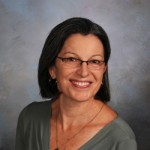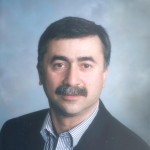Bethany Farrell ’11 is one of 21 UMW alumni currently serving in the Peace Corps.
Nabil Al-Tikriti Presents at Istanbul History Symposium
 On Thursday, Dec. 20, Nabil Al-Tikriti delivered a presentation in Turkish entitled “II Bayezid Oğulları Arasındaki Taht Kavgası / The Fight Between the Sons of Bayezid II for the Throne” to the “Symposium of the Sultan Beyazit II” in Istanbul, Turkey. The symposium was sponsored by Kültür Kenti Vakfı (Cultural City Foundation), Beyoğlu Municipality, Galatasaray University, and Mimar Sinan University. The symposium program included several prominent Ottoman historians.
On Thursday, Dec. 20, Nabil Al-Tikriti delivered a presentation in Turkish entitled “II Bayezid Oğulları Arasındaki Taht Kavgası / The Fight Between the Sons of Bayezid II for the Throne” to the “Symposium of the Sultan Beyazit II” in Istanbul, Turkey. The symposium was sponsored by Kültür Kenti Vakfı (Cultural City Foundation), Beyoğlu Municipality, Galatasaray University, and Mimar Sinan University. The symposium program included several prominent Ottoman historians.
In the course of this presentation, Prof. Al-Tikriti engaged with current debates about Ottoman family values by pointing out that Bayezid II’s extended family members carried out nearly a dozen murders of other family members between 1481 and 1522.
The conference program can be accessed here.
Andrea Livi Smith Publishes Article in Journal
 Andréa Livi Smith, assistant professor and director of the Center for Historic Preservation, published her article entitled “The Young Preservationist: Findings from the First Undergraduate Historic Preservation Education Symposium” in the peer-reviewed journal Preservation Education & Research. PER is the scholarly journal of the National Council for Preservation Education.
Andréa Livi Smith, assistant professor and director of the Center for Historic Preservation, published her article entitled “The Young Preservationist: Findings from the First Undergraduate Historic Preservation Education Symposium” in the peer-reviewed journal Preservation Education & Research. PER is the scholarly journal of the National Council for Preservation Education.
The article is derived from the first Undergraduate Historic Preservation Education Symposium, organized by Dr. Smith and hosted by UMW in June 2010. Dr. Smith is currently organizing the second iteration of the symposium, to be held this summer.
Program Proposals for Black History Month Due 11/16
The James Farmer Multicultural Center is accepting program proposals for Black History Month in February 2013. The 2013 Black History Month theme is “At the Crossroads of Freedom and Equality: Celebrating our Past and Shaping Our Future.” Programs and events that relate to the theme are encouraged, however any programs or events that examine the experiences and contributions of Americans of African descent are welcome. The program proposal forms are due on Friday, November 16, 2012 by 5 p.m. You can send the completed forms via email to Ms. Greta Franklin at gfrankli@umw.edu, or send them to the James Farmer Multicultural Center in Lee Hall, room 211. Go to the James Farmer Multicultural Center’s website at http://students.umw.edu/multicultural/programs/black-history-month/ to obtain the program proposal form. Please contact the James Farmer Multicultural Center at 540-654-1044 for questions regarding Black History Month.
We invite members of the University of Mary Washington community to submit program proposals for the annual Women’s History Month Celebration. Proposals are due by Wednesday, December 12, 2012 and the sponsors will be notified promptly. Approved programs will be included on the Women’s History Month calendar as well as in print and electronic publications. Preference will be given to programs and events relating to the 2013 theme, “Women Inspiring Transformation.”
The program proposal form can be found at http://students.umw.edu/multicultural/programs/womens-history-month/. Please include as much information on the form as possible.
Return forms and appropriate attachments to:
Women’s History Month Planning Committee
James Farmer Multicultural Center
Attention: Marion Sanford
Lee Hall, Room 211
1301 College Avenue
Fredericksburg, VA 22401
Email at msanford@umw.edu
Ultimate Honors
New academic program gives students the chance to reach above and beyond.
Mehdi Aminrazavi Publishes Chapter
Scott Powers Co-Authors French Language Textbook
A Poet’s Perspective
Pulitzer Prize-winning professor is passionate about poetry and mentoring students.
Claudia Emerson Honored as Woman of Distinction
 Arrington Distinguished Chair of Poetry and Professor of English Claudia Emerson was named one of seven “Women of Distinction” of 2012 by the Girl Scouts of the Commonwealth of Virginia. Emerson received the award during a ceremony on Wednesday, Sept. 26. The girl scouting review committee chose the “Women of Distinction” based on their ability to serve as examples of courage, confidence and character. Emerson’s award focused on her accomplishments in culture and communication.
Arrington Distinguished Chair of Poetry and Professor of English Claudia Emerson was named one of seven “Women of Distinction” of 2012 by the Girl Scouts of the Commonwealth of Virginia. Emerson received the award during a ceremony on Wednesday, Sept. 26. The girl scouting review committee chose the “Women of Distinction” based on their ability to serve as examples of courage, confidence and character. Emerson’s award focused on her accomplishments in culture and communication.
Faculty and Alumni Convocation Focuses on the Role of the Liberal Arts

Courtesy of the University of Notre Dame: Mark Roche, Reverend Edmund P Joyce, CSC Professor of German Language and Literature and Concurrent Professor of Philosophy at the University of Notre Dame
The Faculty and Alumni Convocation on Wednesday, Aug. 29 featured former Dean of the College of Arts and Letters at the University of Notre Dame Mark Roche’s keynote lecture about the role and position of the liberal arts. Roche, Reverend Edmund P Joyce, CSC Professor of German Language and Literature and Concurrent Professor of Philosophy at Notre Dame, is the author of seven books, including most recently “Why Choose the Liberal Arts?”
In his remarks, Roche argued for the intrinsic value of a liberal arts education, noting that the joy associated with exploring the life of the mind and the freedom to ask the great questions enshrine life with meaning. But he also stressed that the cultivation of these intellectual virtues are requisite for success beyond the academy. He made a compelling connection between the mental activity in which the liberal arts engage students and the development of character and a sense of vocation. Roche noted that recent surveys of employers indicate that they share this view. Recruiters value the outcomes of a liberal arts education: strong oral and written communication, critical thinking, connecting choices and actions to ethical thought, and an ability to innovate, he argued. Technical expertise by itself is outranked by all of these traits, he said.
Dean of the College of Arts and Sciences Richard Finkelstein also spoke about the importance of the liberal arts, addressing the changing, and often challenging, nature of the discipline:
“In the 19th-century, the essayist Matthew Arnold argued that the role of education is to impart ‘the best that has been thought and said.’ This is a view which most of us share, although with considerable caution. A century and a half later, I doubt many of us could agree on what those best thought and said ideas are; and I expect that some of us—and I include myself—recognize that in a world that recognizes the contingency of value, it’s doubtful that we can—or should—agree on what is ‘best.’ This is one of the reasons why we focus students on the methods and theories through which we acquire knowledge in our disciplines and not just on facts. Knowledge changes, and if there is a best knowledge it’s identified by the fact that it is always being amended. . . . Not knowing what the ‘best that has been thought and said’ is not relativism: it is, in fact, a crucial dogma for the liberal arts. Not knowing pushes us to develop new methods, push for challenging perspectives, and work across disciplines to create knowledge. It stimulates student interest with pedagogy that isn’t uni-directional.”

